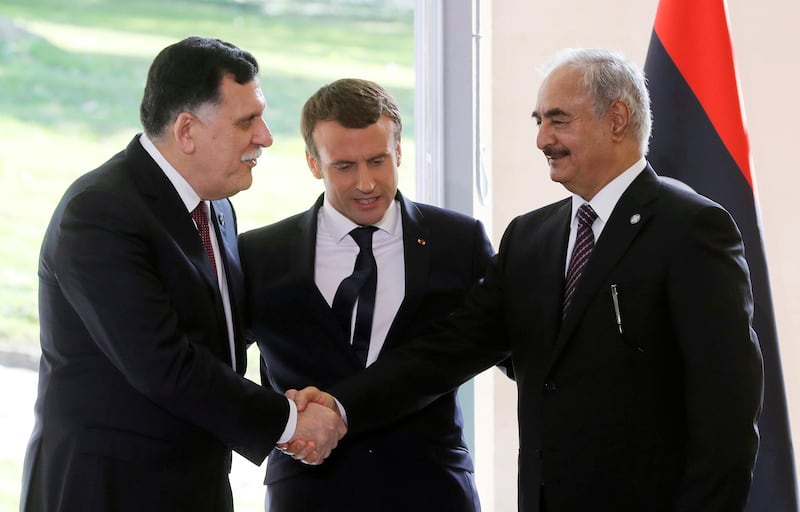French president Emmanuel Macron on Thursday announced plans for France to set up screening centres in Libya for asylum seekers, two days after brokering a peace agreement between the country's two power centres.
"The idea is to create hotspots to avoid people taking crazy risks when they are not all eligible for asylum. We'll go to them," Mr Macron said during a visit to a refugee shelter in central France, adding the plan would be put in place "this summer".
Faced with an increase in terror attacks and a flood of immigrants crossing the Mediteranean, France and other European countries are keen to establish a strong central authority in Libya to end the turmoil that engulfed the country after longtime dictator Muammar Qaddafi was toppled in 2011 and which has allowed exremist militants to gain a foothold and migrant smugglers to flourish.
France is now seeking to build international support for the peace agreement it negotiated in Paris on Tuesday, with diplomats keen to win the backing of the United Nations.
The 10-point peace plan, named the Joint Declaration, includes the promise of a ceasefire and new elections, and was agreed upon by the head of Libya’s UN-backed Government of National Accord, prime minister Fayez Al Sarraj, and his rival Field Marshal Khalifa Haftar, commander of the powerful Libyan National Army, in talks hosted by Mr Macron.
__________________
Read more:
Libya rivals agree to ceasefire deal in Paris
Libya deal is a step forward but challenges remain
__________________
The French president was effusive in praising the two men. “There is a political legitimacy that’s in the hands of prime minister Al Serraj and a military legitimacy that’s held by General Haftar,” he said. “They have decided to work together on a political process.”
French diplomats at the United Nations are urging the global community to support the agreement.
“This initiative taken by the French president is an important and concrete contribution towards a political solution in Libya, which remains the only possible solution to solve the Libyan crisis,” said France’s UN ambassador, Francois Delatrre, in comments posted on the French UN mission website late Wednesday. “I think it is important that the Security Council welcome the meeting held in Paris.
But international consensus is looking fragile after Italy signalled annoyance that the French initiative cut across its own Libyan peace mediation. As Libya's former colonial power, Rome considers it has a special relationship with Libya.
"He [Mr Macron] has brushed us away. We were not consulted," an Italian diplomat told the Reuters news agency.
Mr Delatrre insisted Paris was consulting with all powers. “Italy, as well as the UK and many others are key players in Libya and we are in constant and close consultation with them, and with Italy in particular.”
France can point to statements of support from Egypt and Britain, and has acknowledged that the Paris agreement builds on earlier mediation by the UAE, which oversaw the first meeting between Field Marshal Haftar and Mr Al Sarraj in Abu Dhabi on May 3.
On Wednesday Mr Al Sarraj said support from the UN would be “crucial” for elections that the Paris agreement says must be organised “as soon as possible”.
Yet war-torn Libya continues to be in ferment. On Wednesday GNA forces in Misrata reported the re-emergence of ISIL combat units near the coastal town of Sirte, seven months after the extremist militants were pushed out of the town by Libyan forces backed by US air strikes.
"We have spotted movements by Daesh in the south of Sirte, where they are trying to regroup and break through our forces' lines in the south," said Mohamed Ghasri, spokesman for the Al Bunyan Al Marsous forces in Misrata.
Separately, Mr Al Sarraj agreed with Italy at a meeting in Rome on Wednesday that Italian naval vessels could enter Libya’s coastal waters to tackle migrant-smugglers. Rome has been urging Mr Al Sarraj to grant this access for more than a year, because smugglers currently operate only inside Libyan waters, safe from a European Union naval anti-smuggling initiative, Operation Sophia.
A major hurdle for the Paris agreement is that it must be signed by Libya’s parliament, the House of Representatives, which supervises Field Marshal Haftar’s Libyan National Army, although legislators say they will debate the plan in the coming days.
Meanwhile, there has been no comment from Tripoli militias, some of whom Mr Al Sarraj relies on for support, on whether they will comply with article 7 of the Paris agreement, which calls for militia units to disband. Many militias are political actors in their own right, and their leaders may resist surrendering their political power.
Field Marshal Haftar’s support for the agreement is considered crucial by Paris. His forces and allied units hold more than two-thirds of Libya, including most of its key oil installations, while the GNA controls less than a fifth of the territory, centred on Tripoli and the west coast.
Field Marshal Haftar told France 24 that while his forces would abide by the ceasefire, this did not extend to “extremist” groups.
"Military solutions shall be selected for enemies," he told the TV station. "For example, the Islamic State group, Al Qaeda. And also extremists [such as] the Muslim Brotherhood. These are enemies, there is no doubt on that and there will be no dialogue with them.”
Diplomats are puzzling over whether this declaration is in line with article 2 of the Paris agreement, which says the ceasefire forbids combat “for any purpose that does not strictly constitute counter-terrorism”.





